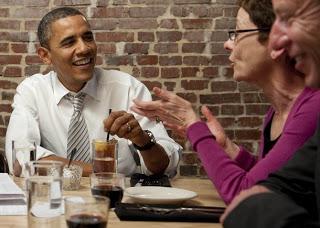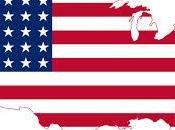 Venticinque domande, che spaziano in ambiti diversi, alle quali Laura Olin ha risposto puntualmente. Ci sarebbero molte riflessioni da fare sulla disponibilità e mentalità che caratterizzano gli esperti e i professionisti statunitensi, ma li riserverò per un'altra occasione. Nel frattempo vi propongo di seguito le sue risposte.
Venticinque domande, che spaziano in ambiti diversi, alle quali Laura Olin ha risposto puntualmente. Ci sarebbero molte riflessioni da fare sulla disponibilità e mentalità che caratterizzano gli esperti e i professionisti statunitensi, ma li riserverò per un'altra occasione. Nel frattempo vi propongo di seguito le sue risposte.1) Che posizione hanno assunto gli Stati Uniti al summit di Dubai sulla proposta di trasferire il controllo di internet in seno all'ONU (v. International Telecommunication Union)? Giovanni Scrofani
Non ho conoscenze in quest'ambito, mi dispiace!
2) Dal 2008 ad oggi, in termini percentuali di voti, quanto è cresciuta l'importanza del web nelle campagne elettorali USA? Francesco Lanza
Non possiamo collegare direttamente l'impatto della campagna online alle percentuali di voto, ma per dare un'idea dell'impatto, la campagna di Obama ha raccolto 500 milioni di dollari nel 2008; questa volta, siamo riusciti a raccogliere più di 700 milioni di dollari. In termini di messaggi e informazione, penso sia corretto dire che il web ha avuto più influenza questa volta perché ci sono più utenti di Internet negli Stati Uniti rispetto al periodo dell'ultima campagna, e in particolare più utenti di Facebook, Twitter e altri social network.
3) Qual è l'errore che un social media manager deve assolutamente evitare in una campagna elettorale? Francesco Lanza
La cosa principale che abbiamo sempre tentato di evitare sono stati gli errori fattuali - dire cose che non erano vere, o dare alla campagna di Romney (oppure ai media) materiale con cui attaccare il Presidente. Siamo stati estremamente attenti nell'assicurarci che il nostro lavoro aiutasse la campagna, e non la danneggiasse.
4) Avete gestito in quattro i social media durante le ultime presidenziali. A quanti utenti/domande mediamente avete risposto al giorno? Francesco Lanza
Proprio perché il nostro staff era così ridotto, non siamo stati in grado di fare molta interazione sui social media in stile customer-service. Penso che sarebbe fantastico se il team social media del 2016 riuscisse a farlo, nel caso avessero più risorse di quante ne avevamo noi.
5) Voi del team digitale di Obama decidevate autonomamente cosa era rilevante e cosa no tra ciò che avveniva o che stava per avvenire. Pensa che anche all’interno della redazione di una testata digitale questa libertà di decisione e azione sia fondamentale? Roberto Favini
Nonostante avessimo molta libertà nello scegliere cosa pubblicare sui nostri canali in base a quello che pensavamo avrebbe avuto l'eco migliore su ogni piattaforma, devo far notare che in effetti avevamo indicazioni dalla leadership della campagna sul messaggio del giorno, a cosa dare priorità, etc. Immagino che le testate digitali cerchino di trovare lo stesso equilibrio - sebbene sia importante che ciascuno lavori per raggiungere lo stesso obiettivo, penso che tutto funzioni al meglio quando la leadership ha fiducia che i team facciano ciò per cui sono stati assunti. Siamo fortunati ad essere in quella posizione nella campagna.
6) In che modo avvenivano le interazioni tra i componenti del team dedicati alla gestione in real-time e quelli dedicati all’analisi? Roberto Favini
Il nostro team verificava le metriche durante il giorno e riceveva rapporti settimanali più dettagliati dal nostro team di analisi. A volte richiedevamo rapporti una tantum se ci servivano i numeri per prendere delle decisioni.
7) Se lei fosse il social media manager di una importante compagnia, che tipo di endorsement e di organizzazione interna si aspetterebbe perché si possa parlare di social enterprise? Roberto Favini
Idealmente il desiderio di fare quel genere di lavoro partirebbe dall'alto, con capi che ne capiscono l'importanza, o almeno sono aperti ai benefici potenziali per un'azienda e per un team.
8) Avendo potenziale accesso a servizi di predictive big data analytics come Recorded Future e Trapwire, c’è la possibilità che in questi altri quattro anni queste tecniche diventino di uso comune per l’amministrazione Obama, per esempio per monitorare, comprendere e soddisfare l’andamento del sentimento e delle esigenze dei cittadini americani in modo ancora più tempestivo e accurato? Roberto Favini
Abbiamo usati gli analytics per il comportamento di voto ma non so nulla del resto! Quanto al come i dati dovrebbero essere usati per perseguire gli obiettivi dell'amministrazione nei prossimi quattro anni, proprio questi giorni si stanno prendendo decisioni su come dovrà essere l'organizzazione della nuova campagna.
9) Quanto l'immagine costruita deve rispecchiare l'intera personalità del Presidente Obama per essere credibile? E quando, invece, è necessario ingigantirne solo i punti di forza? Marta Cassano
Abbiamo cercato di enfatizzare i suoi punti di forza il più possibile! Abbiamo tentato di assicurarci che tutto ciò che facevamo mettesse il Presidente in buona luce, ed abbiamo ottenuto il successo maggiore quando ne mostravamo gli aspetti più umani.
10) I meme fotografici sembrano essere stati molto importanti durante queste elezioni. Avete creato e rilasciato qualche meme fotografico? Michael Brandvold
Sì, abbiamo tentato di trarre vantaggio dai meme ove possibile - spesso rilanciando meme che erano nati spontaneamente su Internet, piuttosto che investire molto tempo (che non avevamo) nel creare i nostri. Per esempio, ci sono queste immagini che abbiamo condiviso sul nostro Tumblr.
http://barackobama.tumblr.com/post/32878470006/thing-meet-other-thing-via
http://barackobama.tumblr.com/post/32873587186/thedemocrats-you-cant-make-this-up-mitt
11) Come avete monitorato e rettificato dichiarazioni false nei meme fotografici? Michael Brandvold
I membri dei team digital e comunicazione monitoravano i social media e i blog per vedere cosa le persone dicevano e per rispondere ove necessario - ma per la maggior parte monitorando tweeter influenti, hashtag, blog, etc.
12) Pensi che i meme fotografici debbano essere regolati come tutti gli altri messaggi della campagna ufficiale? Michael Brandvold
Personalmente non ne vedo il bisogno. E' tutta libertà di parola, e la maggior parte delle comunicazioni online non sono regolate oltre alle normali norme legate ad attività criminose.
13) Quanto la campagna elettorale ha risentito degli umori, del sentiment, degli utenti delle varie community di Obama durante la campagna stessa? Marco Dal Pozzo
Non facevo parte del team che lavorava direttamente con quelle community, ma so che hanno ascoltato molto quel che le persone pensavano e hanno incorporato il feedback nella direzione di ciò che stavano facendo. A differenza dei Repubblicani, noi abbiamo portato avanti una operazione grassroots reale - non ci sarebbe stata alcuna campagna se non avessimo ascoltato i volontari e i supporter.
14) Quanto, nelle scorse elezioni, tale sentiment ha davvero guidato le scelte politiche di Obama e quanto si crede le guideranno nell'Amministrazione appena iniziata? Marco Dal Pozzo
Dovresti fare questa domanda a qualcuno di molto più intelligente di me.
15) Quali contenuti hanno prodotto maggior engagement? Marco Dal Pozzo
Sui social media, generalmente abbiamo visto che le persone rispondevano di più a contenuti che descrivevano il presidente come persona (il suo essere divertente, momenti insieme alla famiglia), oppure questioni sociali che toccavano molti dei nostri sostenitori - stipendio equo, diritti degli omosessuali, uguaglianza delle donne, ambiente.
16) Che strumenti usavate per misurare il gradimento di post/tweet/pitch? Luca Mecca
Ci siamo affidati molto alle metriche di back-end native delle piattaforme (Facebook analytics, Twitter analytics), così come numeri dalla nostra piattaforma di fundraising ed email.
17) Avete ricevuto un trattamento speciale da parte delle piattaforme online? Avete avuto la possibilità di usare feature che gli utenti normali non possono avere? Ad esempio su alcuni video di YouTube ci sono link nelle note che puntano a siti esterni, quando sulla piattaforma non sarebbe possibile farlo. Maria Petrescu
Abbiamo avuto accesso a feature che anche altre grandi organizzazioni possono avere (Twitter analytics back-end, Tumblr analytics back-end), a cui utenti normali di solito non hanno accesso, è vero. Ma non so nulla su YouTube nello specifico, mi dispiace!
18) Perché avete scelto una vecchia foto come immagine della vittoria? Giaimeddu
Abbiamo pensato che l'emozione di quella foto descrivesse al meglio il momento - non abbiamo pensato che contasse il fatto che fosse stata scattata durante l'estate. La cosa più important era che si trattava di un momento personale e gioioso tra il Presidente e la First Lady.
Maria Petrescu | @sednonsatiata
Laura Olin's answers to our readers' 25 questions
A few days ago we collected a series of questions for one of the most interesting figures for those who deal with social media, the responsible of the social media re-election campaign of President Obama.
Twenty-five questions, in very different fields, to which Laura Olin answered very precisely. There are many insights on the availability and mentality that characterize American experts and professionals, but I'll keep them for another occasion. In the meanwhile, here are her answers!
1) What is the United States' position at the Dubai summit on the proposal to transfer the control of the Internet inside the UN? Giovanni Scrofani
I'm not knowledgeable about this realm of policy, sorry!
2) From 2008 to today, in terms of vote percentages, how much has the importance of the web grown in the USA elections campaigns? Francesco Lanza
We can't directly track the impact of online campaigning to vote percentages, but to give you an idea of the impact, the Obama campaign raised $500 million in 2008; this time around, we raised over $700 million. In terms of messaging and information, I think it's fair to assume the web had more influence this time because there are more internet users in the U.S. since the last campaign, and particularly more users of Facebook, Twitter, and other social networks.
3) What is the mistake that a social media manager must absolutely avoid during an elections campaign? Francesco Lanza
The number one thing we always wanted to avoid was factual errors - saying things that weren't true or otherwise giving the Romney campaign (or the media) something to attack the president with. We were incredibly careful about making sure our work always helped the campaign, never hurt.
4) Four of you have managed social media during the last campaign. How many users/questions have you answered a day, on average? Francesco Lanza
Because our staff was so small, we actually weren't able to do a lot of customer-service type of social media interaction. I think it would be a great thing for the 2016 social media team to get into if they have more resources than we did.
5) You, the members of Obama's digital team decided autonomously what was relevant and what wasn't among the things that were happening or were about to happen. Do you think that this freedom of decision and action is also vital inside the redaction of a digital newspaper? Roberto Favini
Though we were given a lot of freedom to direct what went onto our channels according to what we thought would resonate the best on each platform, I should note that we did get direction from campaign leadership on the message of the day, what to prioritize, etc. I imagine that digital newspapers try to strike that same balance - while it's important for everyone to be working toward the same goals, I think everything works best when leadership trust teams to do what they hired them to do. We were fortunate to be in that position on the campaign.
6) How did the interactions between the components of the team dedicated to real-time management and those dedicated to analysis occur? Roberto Favini
Our team would check metrics throughout the day and we'd also get more in-depth weekly reports from our analytics team. We sometimes requested one-off reports if we needed numbers to make a decision about something.
7) If you were the social media manager of an important company, what type of endorsement and internal organization would you expect in order to talk about social enterprise? Roberto Favini
Ideally the willingness to do that kind of work would be built in from the top, with leaders who understand the importance of it, or are at least receptive to the good it can do for a company and for a team.
8) One of the reasons why Mr. Obama won the presidential election was certainly to have better used social media and brought them to the top level than Mr. Romney, who exploited them with varying fortunes. For example, Mr. Romney has used the power of big data analytics only for elections, while Mr. Obama used them since four years also to plan their trips abroad on the basis of financial markets and introduced even predictive analytics for big data better understand the voting intentions of Americans and prevent terrorist activities.
Having potential access to predictive big data analytics services as Recorded Future and Trapwire, maybe Obama administration also uses them in these four years to monitor, understand and meet the sentiments and the needs of American people (and not only) in a more timely and accurate fashion? Roberto Favini
We used analytics for voter behavior but I don't know about the rest! As for how data will be used to further the administration's goals the next four years, decisions are being made now about what the new campaign organization will look like.
9) How much of the built image must reflect the entire personality of President Obama in order to be believable? And when is it necessary to enhance his strong points? Marta Cassano
We tried to enhance his strengths as much as possible! We tried to make sure everything we did reflected well on the president, and always had the most success when we showed him at his most human.
10) Photo memes seemed to really be big this election. Did you create and release any photo memes? Michael Brandvold
Yes, we tried to take advantage of memes when possible—often furthering memes that had organically sprung up on the internet rather than put a lot of time we didn't have into creating our own. For example, here are some Big Bird images we shared on our Tumblr.
http://barackobama.tumblr.com/post/32878470006/thing-meet-other-thing-via
http://barackobama.tumblr.com/post/32873587186/thedemocrats-you-cant-make-this-up-mitt
11) How did you monitor and counter false claims in photo memes? Michael Brandvold
Members of the digital rapid response and communications teams monitored social media and blog traffic to see what people were saying and push back when necessary—mostly just tracking influential tweeters, hashtags, blogs, etc.
12) Do you think photo memes need to be regulated like all official campaign messaging? Michael Brandvold
I personally wouldn't see the need to. It's all freedom of speech, and most online communications aren't regulated beyond rules barring criminal activity.
13) How much has the elections campaign been influenced by the sentiment of users in the various Obama communities during the campaign itself? Marco Dal Pozzo
I wasn't part of the team that worked directly with those communities, but I know that they listened a lot to what people were thinking and incorporated feedback into the direction of what they were doing. Unlike the Republicans, our campaign was a real grassroots operation—there would be no campaign if we didn't listen to volunteers and supporters.
14) How much has said sentiment really guided Obama's political choices and to what extent will they guide them during the Administration that has just begun? Marco Dal Pozzo
You'd have to ask people far smarter than I about that.
15) Which contents have created most engagement? Marco Dal Pozzo
On social media, we generally saw people respond the most to content that spoke to who the president was as a person (being funny, moments with his family) or spoke to social issues that a lot of our base believed in—equal pay, gay rights, equality for women, the environment.
16) What tools do you use in order to measure the performance of posts, tweets, pitches? Luca Mecca
We relied heavily on native platform back-end metrics (Facebook analytics, Twitter analytics), as well as fundraising numbers from our fundraising platform and email acquisition figures.
17) Do you get special treatment from online platforms? Do you get to use features that normal users cannot have? For example, on some YouTube videos there are links in the annotations that point to an external website, which is supposedly not possible on that platform (links in annotations could only link to other YouTube videos, playlists or channels). Maria Petrescu
We got access to features that other big organizations got (Twitter analytics back-end, Tumblr analytics back-end) that normal users don't have access to, yes. I'm not sure about YouTube specifically, sorry!
18) Why have you chosen an old picture as an image of the victory? Giaimeddu
We thought that the emotion of that photo spoke to the moment the best—we didn't think it mattered that it was a photo from the summer. The most important part was that it was a personal and joyous moment between the president and first lady.
19) The evolution of social mediascape in the last years has been changed by the second rise of User Generated Content. Now the net is full of Memes expressing the chance to use an image/logo and text, often creating overturned and lateral senses and meanings. How the Obama staff used them and how are changing the political communication? Are the memes just a weapon against the adversary or they can carry the focus on new political issues? Simone Corami
With everything we did with social media, we wanted to make sure we were talking in the language that people were using to have conversations on the platforms we were dealing with—it's the best way to become a part of the conversation yourself. Memes were definitely a big part of that—we tried to reference them and pop culture generally whenever opportunities arose. They definitely came in handy when dealing with the Romney campaign but we also used them for positive uses. For example, we used the biggest internet meme of all—cats—on Election Day to encourage people to vote:
http://barackobama.tumblr.com/post/35139862739/fidos-going-to-keep-staring-at-you-in-silent
20-21) Has social media changed the political landscape, and if yes, how? Has it changed the dynamic significantly in favor of the kinds of voters that sent Obama back for a second term? Will the Democrats be able to count on using social media to counter the massive amounts of money being spent through super pacs on the other side moving ahead, or is the GOP going to be in a position, given their demographic, to be equally effective, both with social media use and with traditional messaging? Why did the Citizens United decision, And the money it unleashed, particularly on the GOP side, seem to not have the effect for which folks like Karl Rove were hoping and spending? Why was the GOP GOTV operation, specifically the ORCA plan, such a massive fail? Peter Buchi
I think social media has given campaigns many more opportunities to use network effects to their advantage—just getting people to share information with their friends, which is more powerful than campaigns communicating information directly to people. You always trust what you're hearing more when it comes from a friend. Email rather than social media was most important for fundraising this time around, and I would imagine that the same will be true in the next cycle. On the GOP—from what I've read, it sounds like they were putting a lot of stock into outside consultants that weren't dealing directly with each other and might have had their own bottom lines versus the campaign's best interests in mind; we avoided a lot of that by building most everything we did in-house.
22) Where there any social psychology experts involved in the communication, or was it just sheer sensitivity? Maria Petrescu
My team wasn't in direct contact with social psychologists, but some of us had a background in it or were otherwise familiar with a lot of its principles. I myself have degrees in both political science and psychology.
23) What tools do you use to single out and target individuals based on various criteria during the campaign? Maria Petrescu
One of the frustrating things about social media for us was that it is a blunt instrument in a lot of ways—we weren't able to target individuals specifically unless we were interacting with them in a conversation. But on Facebook, for example, we used the platform's demographic targeting to tailor messages just toward women, just toward people age 55 and over, just toward voters aged 18 to 29, etc.
24) What's the next big thing in online communication for politics? Will social media have an impact in the 2016 elections? Maria Petrescu
I think social media will have an impact on the 2016 elections, but it's hard to know what format that will take. In 2008, Facebook was about a third the size it was now, and Twitter was barely a force at all—I think @BarackObama only had 100,000 followers by the end of the 2008 election (as opposed to over 24 million now). Whatever happens, I would guess that the social networks that have the most dominance will be very visually oriented—you can see a trend in that direction with Instagram, Pinterest, etc. already.
25) I see Joe Biden brought Dunkin' Donuts. What's his favorite flavor? Does the Prez eat donuts? Was it the superb and skillful use of social media that turned the election, or was it the sugar rush provided by the Biden delivery? Peter Buchi
On flavors, I wish I knew but I don't! I would credit most of the win to Biden rather than to social media on any day of the week.
Maria Petrescu | @sednonsatiata





